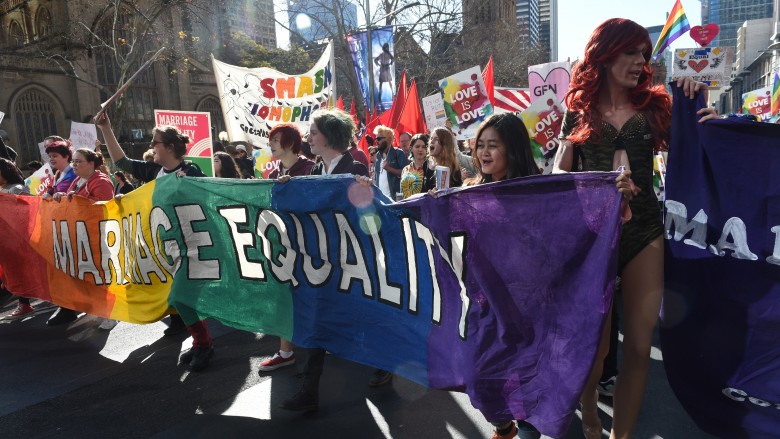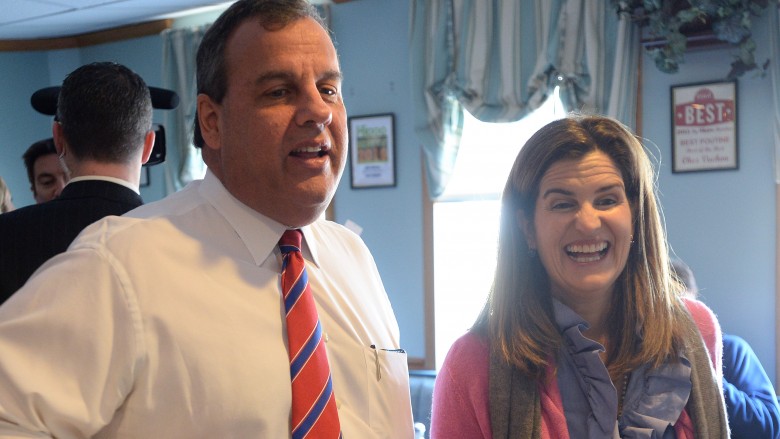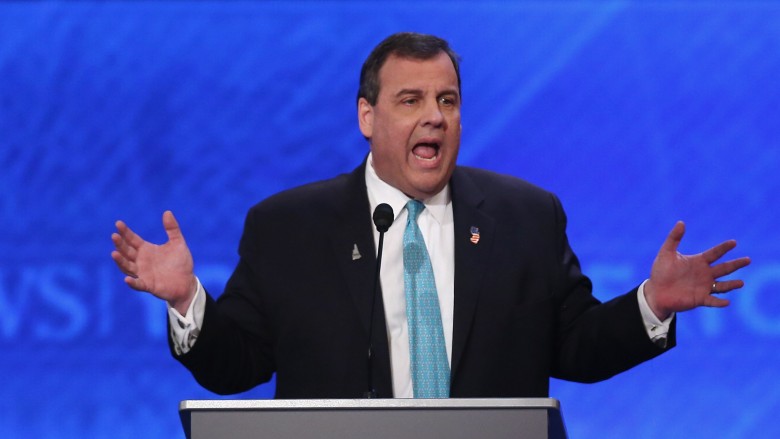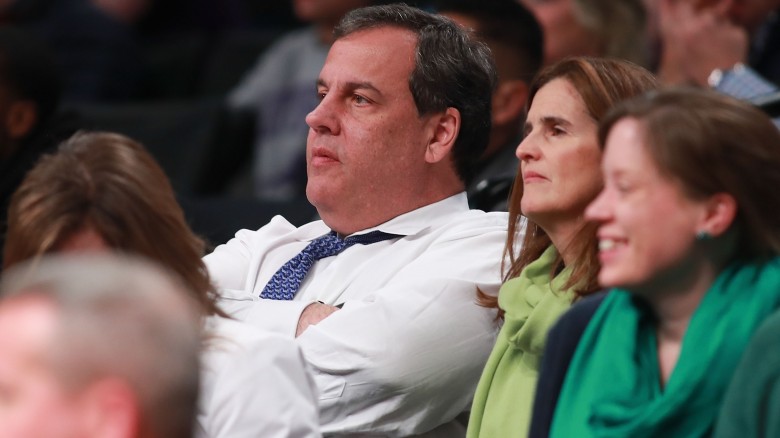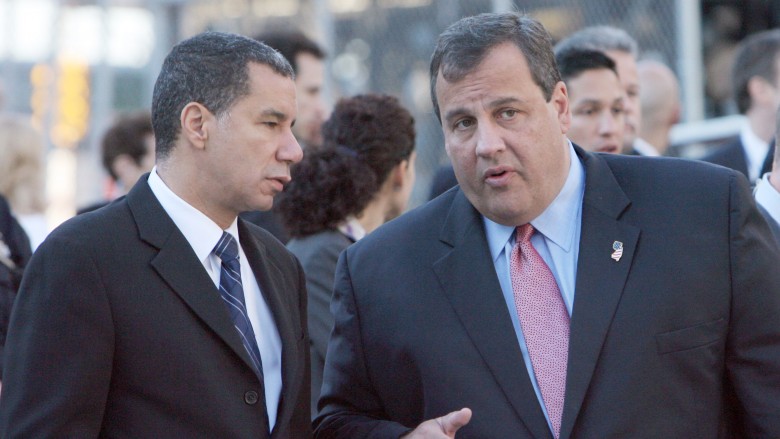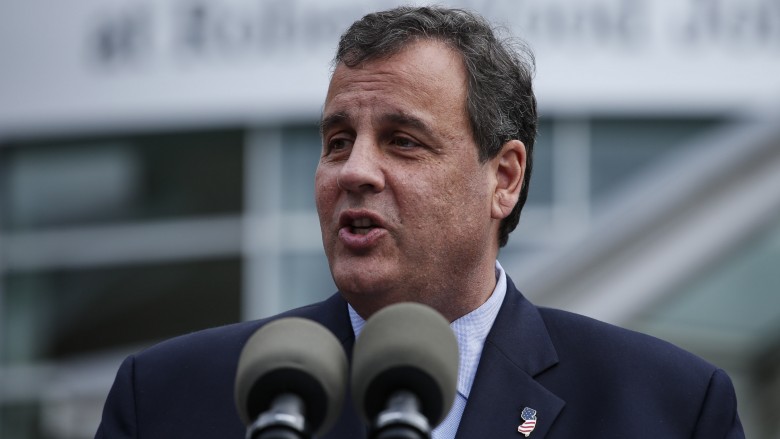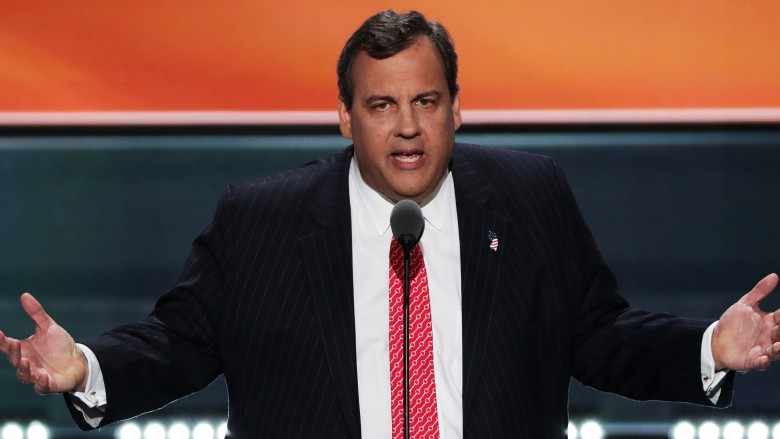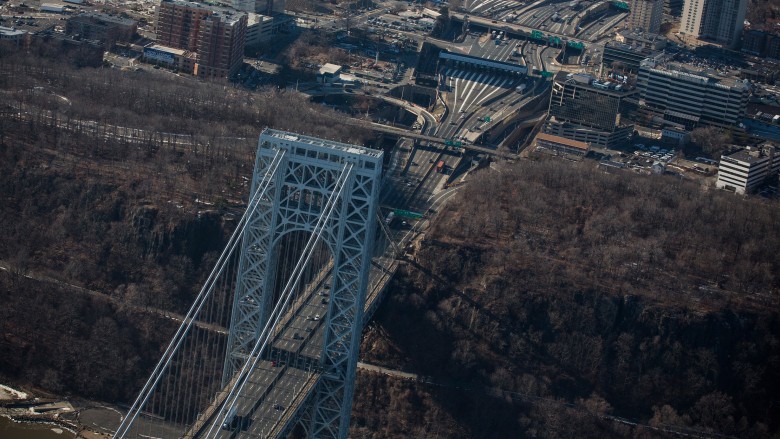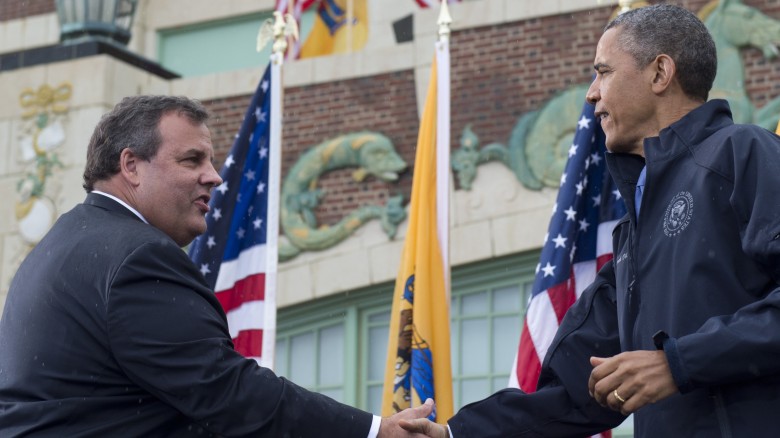The Double Life Of Chris Christie
It is a component of our political process to challenge our elected officials: to shake the trees and see what falls out. With America being divided along party lines, few if any politicians have escaped scrutiny from one side of the aisle or the other. But then there's Chris Christie, the two-term Governor of New Jersey, who grew up in Newark, loves baseball and the Dallas Cowboys, and conspicuously ran for President in this past election.
Over the years, Christie has been depicted in the media as feckless and the source of constant memes, but in fairness, the 54-year-old's political legacy is far more nuanced. He's been on the right and wrong side of corruption allegations, civil liberty laws, drug policy, accusations of mismanagement, and all manner of controversy. This is not unusual for a career politician, especially a moderate like Christie who's had to placate to both parties on different issues. So who is the real Chris Christie? To answer that question, let's look at some instances of double-talk and personal or political misdirection from the Christie files.
Same-sex marriage
In 2012, Christie vetoed a bill in his home State of New Jersey to legalize same-sex marriage. Ever the politician, he didn't say the law betrayed any moral, religious or ethical values he had or that the people of New Jersey share; rather he suggested the State Legislature amend the bill because, as he saw it, it wouldn't provide gay and lesbian couples any more benefits than the State's existing civil union law. Christie suggested appointing an ombudsman to enforce the civil liberties law. In many ways, it's the perfect non-answer for Christie. He did not ultimately pass a bill legalizing gay marriage, surely to the delight of right-wing politicians in Washington, but he also didn't express vitriol toward homosexuals in his fight against the bill, which theoretically softens his image to those on the left.
What's really going on?
Not everybody in favor of New Jersey's legalization bill believed Christie was acting in their interests. Quoted in an article about the veto in The New York Times, Steven Goldman, chairman of the gay rights group Golden State Equality, said, "Frankly, I don't think Chris Christie has an antigay bone in his body. [The veto is] a brutally antigay act, pure and simple." In regards to Christie's ombudsman proposal, Goldman said it was "the equivalent of gold-plating a separate water fountain for a specific class of people." One year after Christie's veto, the courts ruled against him and same-sex marriage was legal in the State of New Jersey. Even though he fought against it, albeit in a round-about way, Christie's tenure as Governor will include the decision to pass this marriage law and at least in outcome being on the right side of history.
He's claimed he's not that wealthy
Chris Christie met his wife, Mary Pat, when the two were studying at the University of Delaware. Mary Pat, who warmed everyone's heart (on the left, anyway) with this intriguingly timed eye roll, recently retired after a lucrative and successful career in investment banking. After working as a lobbyist and lawyer in the late-80s and 1990s, Christie was appointed U.S. Attorney for New Jersey in 2002 before becoming Governor in 2009. U.S. Attorneys earn around $150,000 annually, and the maximum salary for Governor of New Jersey is $175,000. Assuming Christie takes the maximum, it's not the take-home salary of a multi-millionaire—one who might be out of touch with his electorate.
In a discussion with a editorial board of the New Hampshire newspaper Manchester Union-Leader in 2015, Christie said, while complaining about the complexity of Federal tax filing policy, "The fact that my wife and I, who are not wealthy by current standards, that we have to file a tax return that's that thick ... is insane. We don't have nearly that much money." He even doubled down on this statement later, confirming, "I don't consider myself a wealthy man. Listen, wealth is defined in a whole bunch of different ways and in the end Mary Pat and I have worked really hard, we have done well over the course of our lives, but, you know, we have four children to raise and a lot of things to do." This would be a valid defense if only it were true.
But, come on...
Sure, $175,000 salary is significantly more than most of the residents of New Jersey make, but it's not an outrageous sum. Still, it's one of the highest salaries for a Governor in the Country. According to Bloomberg, "Nationwide, New Jersey is tied with Virginia for fifth-highest governor pay, according to the California Citizens Compensation Commission, which sets pay for office holders." Regardless, with Mary Pat retiring and the cost of raising and educating four children, it's not, at first glance, a fib for Christie to assert his family is not wealthy. That said, when the Christies released their 2015 tax returns at the end of 2016, they reported a combined income of more than $900,000 dollars for that year. In 2014, they reported a similar income of around $1,000,000. As this Washington Post article illustrates, whether considering wealth or income, the Christies are firmly in the one percent. In 2009, Christie's net worth was estimated at $3.8 million. He's not the richest man in New Jersey, but even if Christie doesn't consider himself to be a wealthy man, the numbers say otherwise.
He spent a lot of money on food
Along with the $175,000 Christie earns as Governor, he's allocated another $95,000 per year for expense advances paid out quarterly by New Jersey. According to this New Jersey watchdog organization, "Christie spent $360,000 from his state allowance during his [first] five years in office. More than 80 percent of that money, or $300,000, was used to buy food, alcohol and desserts." At Wegmans Food Market alone, Christie shelled out $76,373 over 53 visits, all paid for by the State. This is not the only time Christie has been under fire for misallocated State funds, but more on that later...
Planned Parenthood
In 2010, Governor Christie vetoed nearly $7.5 million in funding that would have gone to women's health and family planning services, including Planned Parenthood. His reasoning is financial, and mentions nothing about ethics.
But as Matt Katz of WNYC explains, after years of stating that his veto was just about money, Christie changed his story in February 2015 while speaking to the conservative CPAC conference, ahead of his Presidential push. "I'm pro-life, I ran as a pro-life candidate in 2009 unapologetically, spoke at the pro-life rally on the steps of the Statehouse—the first governor to ever speak at a pro-life rally on the steps of the Statehouse—and vetoed Planned Parenthood funding five times out of the New Jersey budget," he said.
Incidentally, at one point, Christie admitted to having been pro-choice. During a June, 2011, interview with Piers Morgan, Christie explained how he went from being pro-choice to seeing an ultrasound of his 13-week unborn child and becoming pro-life. He says, "No, I heard a heartbeat. What happened was I had been pro-choice before that. And I would call myself kind of—before that, a non-thinking pro-choice person." In the years since being a "non-thinking pro-choice person," Christie has been harshly critical of the funding of Planned Parenthood in the United States.
He seems lenient on drug offenders
Unlike many of his conservative peers in Washington, Christie is not immovable on changing drug policy in the U.S. In 2013, he introduced a bill that sends non-violent drug offenders to rehab instead of prison in New Jersey, which is great because New Jersey has a serious and growing drug problem; in 2015, nearly 1600 people died from a drug overdose, which is up around 20 percent from the year before. So Christie has promised to focus his last year as Governor on slowing and treating his home State's drug problems. In 2014, Christie lost a good friend from law school to an overdose of painkillers and alcohol. During a speech he gave at the New Hope Baptist Church in Newark, New Jersey, Christie said, "This is not just about young people. This is not just about the poor. This is not just about the uneducated. This is about anyone, at anytime, who could fall victim to this. And you know, I just miss my friend."
But does not want to decriminalize weed
While Christie's sympathies and overall policy on drugs are left of center politically, decriminalization of weed is one thing he adamantly opposes. As is the case with many of his objections as Governor, Christie uses economics to strike down policies or ideas that might ostracize him from his conservative backers. During that same speech in Newark, Christie says about decriminalization, "Ask Colorado if there's economic benefits. When banks won't take the money because the federal government still says that marijuana is a criminal substance, and these shops are operating in cash, ask them how much they've gotten in tax revenue on a cash based system. It's a fallacious argument and it sends the wrong message to our children. I don't favor it, and I will never favor it."
It's not that Chris Christie needs to be in favor of decriminalization, and his arguments against it are well put. But if getting away from incarceration for drug offenders is a keystone of Christie's policies in office, decriminalization might be a good next step, at least worth considering.
One word: Bridgegate
Perhaps the most infamous of all the Chris Christie scandals is the George Washington Bridge lane closure, affectionately referred to in the news as "Bridgegate." The story goes that on September 9, 2013, several lanes at the main toll plaza of the New Jersey side of the George Washington Bridge were closed, causing a massive traffic jam in the surrounding town of Fort Lee. The lanes remained closed until September 13. Federal prosecutors indicted and tried two former Christie administration officials for their part in allegedly orchestrating the lane closures. The reason, prosecutors asserted, was to punish Mayor Mark Sokolich of Fort Lee, New Jersey, for failing to endorse Christie during his re-election. The two top aides were found guilty of all charges. Separately, a complaint of misconduct was filed against Christie, and despite his efforts to have the case tossed, he may still have to face a trial. The New York Times has a fantastic timeline of the Bridgegate scandal.
For what it's worth: Christie has denied any participation in or knowledge of the lane closures.
His handling of Hurricane Sandy relief money was investigated
One year before Bridgegate, Chris Christie was dealing with the fall out of Superstorm Sandy. During that time, Christie was considering a run for President. After the hurricane, the Governor went on Fox and Friends and said, "I have got a job to do here in New Jersey that is much bigger than presidential politics. And I could care less about any of that stuff." He continued, "I have a job to do. If you think right now I give a damn about presidential politics, then you don't know me." Fair enough. In fact, Christie's leadership in response to the storm was championed by people on both sides.
But in 2014, Federal officials launched an investigation into Christie's use of Sandy relief funds to pay for television ads that would promote tourism at the Jersey Shore. The Feds allege that Christie specifically chose a marketing firm for the TV ads that charged 2.2 million more than the competitor. Christie chose this firm, they say, because its pitch involved putting Christie and his family in the television spot, which Christie could use as free advertising during his re-election campaign.
On a sunnier note, Christie did expand an aid program to fund victims of Hurricane Sandy in August of last year. They will receive $42 million in relief through grants.



